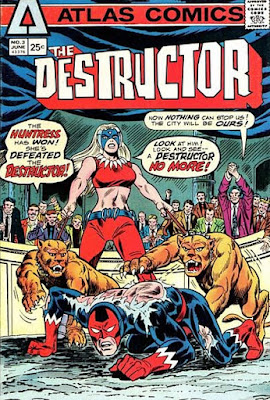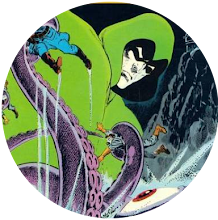If there's anything I love to do on a Sunday night, it's picking up furniture and flinging it around.
That's why I've such a deep affection for the Savage She-Hulk.
OK, admittedly, I don't.
To be honest, when I first read her adventures in whichever Marvel UK book it was that reprinted them, I thought she was as dull as ditchwater and not a patch on Spider-Woman who, at least, had a hint of mystery and trauma about her.
However, as we're somewhere around the fortieth anniversary of the green gal's gamma-spawned debut, that's not going to stop me reviewing the story which introduced her to an awestruck world.
Because he's in LA, and actually has some clothes on, for once, Bruce Banner decides to drop in on his cousin the criminal lawyer Jen Walters because, as we're told, he and she have always been so close they're practically like brother and sister.
That's right. That's the woman he's never mentioned in any story, ever, in his near-two-decade history.

Not only that but, when he shows up, it quickly emerges that Jen doesn't even know he's the Hulk, which you would have thought everyone on Earth would be aware of by now. We're also told he's not seen her since he was a student.
Some observers might think they're starting to look suspiciously like total strangers.
Anyway, it turns out Jen's representing a mobster who's been framed by another mobster and, to flush the other mobster out, she's started a rumour that she has evidence against him.
Needless to say, the other mobster's not standing for that kind of thing, so he's sent his men to kill her.
And that's what they do, gunning her down in the street, outside her home.

Except, it's not what they do, because Bruce just happens to be there and, after defeating the would-be assassins, with a garden hose, he eschews the idea of calling an ambulance and, instead, carries the wounded woman around the streets until he just happens to blunder across a doctor's house.
Thereupon, he breaks in and proceeds to give her a transfusion of his own radioactive blood.
When the police show up to investigate, he turns into the
Hulk, off-screen, and smashes out through the wall, never to be seen again in this issue, leaving Jen to the care of the local hospital.
Unfortunately, the other mobster didn't get where he is by giving up just because his men can't cope with a garden hose, and he sends them to the hospital to have another go at killing Jen.
And this attempt's no more successful than the last because, no sooner have they started trying to drug her, than she turns green and starts throwing her weight around.
The crooks flee but she pursues them into the street, forces them to confess their wrongdoings and then hands them over to the police before returning to the hospital to plan her future in crime-fighting.

It has to be said, it's not a comic that feels like a huge amount of care's been put into it. The artwork by John Buscema is not his best. It doesn't look as attractive as we're used to. Nor does it have the energy and dynamism we associate with him. A suspicious man might say it feels suspiciously like it's something he's knocked out on auto-pilot.
Likewise, Stan Lee's script doesn't feel like a labour of love either. For the first part of the tale, despite it being her comic, Jen's a supporting character, with the story focusing entirely on Bruce Banner and his concerns. Jen's only allowed to take over as central character once Bruce has fled.
And she doesn't get to be that for long because, within a few panels of it, the She-Hulk arrives and takes over as protagonist. The truth is Stan doesn't seem very interested in Jen, a fault that possibly we might be able to level at The Man when it came to female characters in general, over the course of his writing career.
Bruce and Jen's clear lack of familiarity with each other, despite us being told they're incredibly close is jarring and yanks you out of the tale, while Bruce carrying Jen around the street, in the hopes he'll just happen to blunder across a doctor's house doesn't seem the best thought-out plan ever.
It does also strike you that the tale seems aimed at fans of the Hulk TV show, rather than those of his comics. The portrayal of Banner here, as a fugitive, fearful of the authorities unearthing his true identity, feels more in line with the Bill Bixby incarnation of the character. He's also never referred to as Bruce in the story, just, "Doc," with Lee claiming, on the splash page, that it doesn't matter what his first name is.
So, overall, it's not a great story - which is to be expected, as it was, reportedly, created for legal reasons, rather than anything else.
However, the one good thing about it is that, thanks to Lee's involvement, its second half does have the feel of a 1960s Marvel super-hero origin tale and, so, it does, at least, bring back warm and fuzzy memories of the Silver Age and the first time we met all those 1960s Marvel characters who so enchanted our childhoods.
Potential further reading:













































































